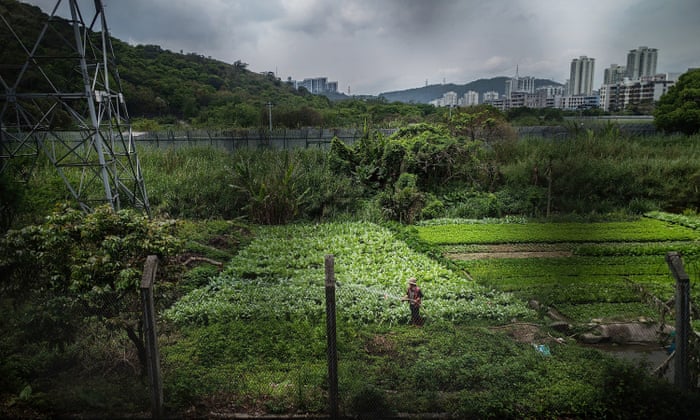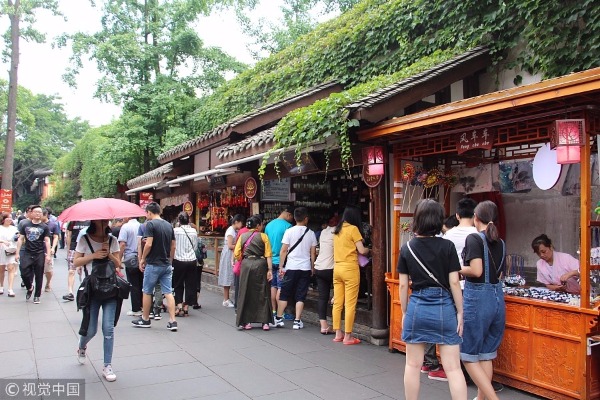Doomed by an Official Label
"[The findings] pose an interesting and socially important puzzle [signifying policy implications for global developing nations]."
"Migrant employment can be unpleasant and insecure, and this depresses migrant happiness."
"[Migrants appear to have] excessively high expectations of the conditions they would experience in the city."
"[Migrants may successfully predict their incomes to rise moving to the city] but not how t heir aspirations would rise as they became part of a very different urban society."
John Knight, economics professor, Oxford University, Ramani Gunatilaka, director, Centre for Poverty Analysis, Columbo
 |
| Shenzhen, a megacity of 12 million people, is merely one element of the world’s largest continuously urbanised area. Photograph: Dowell/Getty Images |
A mass exodus of hundreds of millions of people in the past few decades occurred when Chinese living in the vast nation's countryside migrated to its cities. During that period, the Chinese economy, its manufacturing and trade leaps lifted an enormous number of people out of poverty and into the burgeoning middle class. It represented an amazing and relatively swift transition in the most populous country in the world, in a shift from misery for so many to the satisfaction of a raised standard of living.
As a huge migration resulted in rural folk seeking work in urban settings, those cities grew exponentially in population size. There were certain sacrifices on the part of the migrating job-searchers, many leaving children behind to be raised by their grandparents. But the goal was to seek aspirational opportunities with expectations of achieving higher pay and a quality-of-life existence. A study recently undertaken questioned whether their new status satisfied the urban dwellers once villagers.
The study results appear to indicate without question that the move from villages to cities did not result in greater happiness despite higher incomes. In fact, those who were left behind in their traditional villages were, in the final analysis, happier than the migrants now living and working in cities. The question is why is this so? It is a question with a complex answer, with many things contributing to the dilemma of elusive happiness.
 |
| A farmer waters his crops in what little rural land remains between Shenzhen and Hong Kong. Photograph: Lam Yik Fei/Getty Images |
Starting perhaps with feelings of insecurity and unrealistic expectations, with aspirations that continued to rise outpacing their fulfillment. And perhaps the fact that proximity to others who are better off than the once-villages-turned-city-dwellers, even though they managed to earn far higher wages than they had, in their villages. Did they reconsider and think of leaving the cities and moving back to the villages? Evidently not; among other reasons, it would be losing face.
The study was published within the annually-produced World Happiness Report, based on an official household-based survey taken in early 2003, showing that average income of rural-urban migrants was 2.39 times higher than rural dwellers'. Wealthier yet however, were permanent residents of cities in possession of urban residence registration.
On a scale of 0 (unhappy) to 4 (very happy), people responded indicating the happiest group represented those who had remained in villages, scoring an average 2.7, while urban-born Chinese scored 2.5, and migrants 2.4. Partially it appears the reason for the differentials are social and economic discrimination relating to the registrations given rural as opposed to city-dwelling families. Once issued with a rural registration, it is permanent despite a move to the city.
Making it more difficult with a rural registration to obtain higher-status and -paying employment, and more difficult accessing housing, education and health care. Figures for 2015 indicate there were 225 million rural registration migrant workers in Chinese cities, an increase from 125 million in 2005. Peculiarly, even though migrants achieved higher wages in cities, two-thirds claimed they were unhappy with their low income.
It might have been much higher than their incomes in their native villages, but in comparison to city wages their earnings were on the low end; everything is relative. And there is no return since once having lived a city life, the rural village life appears unappealing to those who made the transition. This study was part of an annual examination of subjective well-being in over 150 countries, published by the Sustainable Development Solutions Network, a United Nations initiative.
This year's annual rankings found Finland in the top spot as the happiest country worldwide. Canada came in seventh, while the United States ranked 18th. Taiwan was in the 26th place, Hong Kong 76th, and China in 86th place of 156 nations ranked. Despite the dramatic economic success of per capita incomes rising in China, levels of happiness lag behind many other countries, including those of developing nations.
 |
| Tourists visit Jinli, a traditional lane, in Chengdu, Sichuan province. [Photo/VCG] |
Labels: China, Economics, Happiness, Population

<< Home